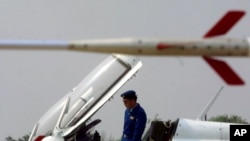U.S. defense analysts say the bits of information contained in China’s recently released biennial report on its military sheds some light on the country’s growing capability and ambitions. The document, they say, paints a picture of an increasingly confident military, but it does little to address more controversial topics such as weapons systems China is developing, its cyber operations, and its ambitions in space and the South China Sea.
China’s most recent report on its military begins by focusing on how the structure of international power is changing and on the rise of developing countries - what analysts say is a thinly veiled reference to itself.
"They see themselves as ascendant; they see things as going in their direction in terms of changes in the global balance of power. And they see themselves reaping the benefits of decades of high levels of investment. So the main thing that struck me about this report is the confidence that seeps through the entire document," said Asia security expert, Abe Denmark.
China has issued seven white papers since 1998. In its most recent report, Beijing tries to help other countries better understand its armed forces. The document also focuses on how China is increasingly confronted by a range of what it calls "diverse and complex" security challenges.
Dean Cheng, an Asia security expert at The Heritage Foundation, a Washington-based research institute, says that this year's white paper includes discussion of confidence building measures and military diplomacy.
He says China for the first time gives a breakdown of acquisition priorities by military service and by branch. "They didn’t necessarily get into deep specifics, but it provides an interesting glimpse into what the PLA [Peoples Liberation Army] intends to do. And they are very clear about this that their defense build-up is not over, that this is an ongoing operation," Cheng said.
Last month, China announced that its military would grow by 13 percent this year, spending more than $91 billion on defense. China says it is increasing military expenditures to update its armed forces and that its plans do not pose a threat to other countries, pointing out that its defense budget is less than that of the United States.
But what worries analysts and foreign governments, says Denmark, is not necessarily how much China spends on its Peoples Liberation Army, or PLA. "China is developing a significant military capability, and it has every right to do so. Beijing can choose to invest its money however it chooses, including in the PLA. The question is not if China will be a significant military power, the question is how it will use that military power," Denmark said.
One positive aspect, Denmark says, is China’s deployment of a 6,000 ton frigate off the coast of Libya to help with humanitarian operations there. But China's behavior in recent years in the South China Sea and along in its coastal waters have raised concerns in the region and the United States.
Gabe Collins, co-founder of the analytical website China SignPost says that one of the key things missing from all of China’s defense white papers is more information about its capabilities.
"If you look at other militaries, like for example the reports from the United States -- the nuclear posture review and the quadrennial defense reviews and so forth -- there is not only discussion about some of the strategic plans and intentions, but you also have discussion of some concrete capabilities," Collins said.
Asia security analyst Dean Cheng agrees, saying that what he finds most interesting about this year's report is the information that is left out. "There is no mention, for example, of the South China Sea. This has been a major topic of concern; it’s been an irritant in U.S.-China relations. But there is no hint as to where that sits in there concept of operations. There is very little mention of cyber warfare and relatively little mention of space," he said.
More information about China's capabilities, analyst Collins says, could help build trust.
"If there was a bit greater discussion of some of these new capabilities particularly in the aerospace arena, with regard also to some of the potential access denial systems - things like anti-ship ballistic missile systems and so forth - I think it would really enhance the trust building value of the report," Collins said.
Analyst Abe Denmark says that it does not surprise him that China did not discuss controversial issues in the report because Beijing does not believe that military transparency is in its interest. In his view, China's white paper is a benign public diplomacy document that avoids issues that could portray Beijing as being aggressive.
Analysts: China Defense White Paper Avoids Controversial Topics









